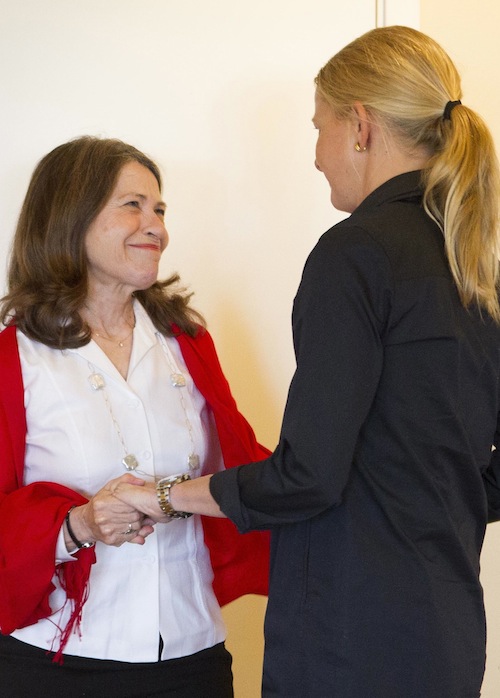The idea was appealing from the start: convene a group of older but far from doddering global leaders, women and men justly renowned for their integrity and achievement, and ask them to serve as tribal elders for a world in need of their moral clarity and sensible savvy. In 2007, Nelson Mandela took up the charge. With the help of musician Peter Gabriel and entrepreneur Richard Branson, he persuaded 10 exemplary human beings to join the founding body that has become The Elders.
Grand visions like this get the blood flowing. They stoke our belief that peace is possible and a more equitable, sustainable world within reach. But for such visions to take root, they must be grounded in strategy and nourished by action. In 2008, The Elders found the partner they needed to do just that in CEO Mabel van Oranje.

Over the past four years, Jeff and I have seen, first-hand as members of The Elders’ Advisory Council, this bold and beautiful vision brought to life. Elders’ missions to some of the most bitterly contested places on earth—Sudan, the DPRK and South Korea, Israel and the West Bank, Zimbabwe, Cyprus and others—have shown how to navigate mine-fields; by spurring dialogue, comforting the afflicted and speaking truth to power, Elders have proven again and again that peace has a fighting chance. But missions like these don’t just happen; thanks to Mabel and her team, they were impeccably planned and superbly executed. And even more critical, follow-up continues.
Elders have also taken positions and made statements on climate change and injustice, but on no issue have they been more outspoken and committed than that of women’s rights. In December, 2008, at the organization’s meeting in Paris, former U.S. President Jimmy Carter inspired his fellow Elders to challenge head-on the role of religious and traditional practice in oppressing women.
The following year, when The Elders met in Johannesburg, Mabel and her team invited tribal chiefs, religious leaders, women’s rights champions, and experts in the field to join them. During a special session, deftly chaired by Elders Graca Machel and Gro Brundtland, an opportunity emerged: to use The Elders’ convening power to form an alliance focused on child marriage, all too commonly sanctioned by religion, reinforced by poverty, and sustained by tradition. Today, thanks to Mabel’s and the Elders’ steadfast leadership, the Girls Not Brides alliance has more than 120 members from 30 countries, and is on its way to ridding the world of a devastating wrong.
Heading to the spring 2012 meeting of The Elders in Oslo, I knew the organization would be hard-pressed to get through its heavy agenda. But next steps on Sudan and South Sudan, Israel and Palestine, the Korean peninsula, women’s rights, child marriage and the budget weren’t the only things on my mind. I also knew how tough this meeting would be for Mabel.
In February, Mabel’s husband, Prince Friso van Oranje, was caught in an avalanche; he remains hospitalized, and the timeframe and chances for his recovery are uncertain. How on earth would she manage the meeting? How would the Elders? The rest of us.
On Monday afternoon, the meeting’s first day, Archbishop Desmond Tutu, our beloved chair, convened a joint session of the Elders and Advisory Council. “My dear friends,” he began, his voice steady, but solemn, “what we’ve all feared has come to pass. Mabel has resigned her position as our CEO.” I fought tears, unsuccessfully, as did others. Was this the right decision for Mabel, for the organization? I’d been hopeful we would be able to give her time and space, but Mabel being Mabel—she simply could not reconcile her responsibilities as CEO with the all-consuming reality of her changed life, her husband’s condition, their daughters’ well-being.
Wise in the ways of the human heart, Archbishop Tutu knew we were all reeling, even with the consolation of Mabel’s continued engagement over the months ahead as “senior advisor.” “We need a little ceremony,” he said, and then he asked me if I’d speak on behalf of the Advisory Council. Later, during an Advisors’ session, I asked everyone to contribute—and the love and respect, images and memories, poured out. I took notes, circled words, added a few phrases and hoped for the best.
It was one of the great honors of my life, to speak for us all, about and to a woman whose leadership has been vital to the small miracle that is the Elders. Motivated by the power of the Elders’ vision, Mabel has succeeded in making sure the organization carries out real work, work that makes a difference where it matters most, as she likes to say, “on the ground.” Her integrity, tireless dedication and spirited belief in the power of good people to make a difference have been a gift—to all of us, and to the cause of building a more just and peaceful world.
(Photos by Jeff Moore, The Elders)